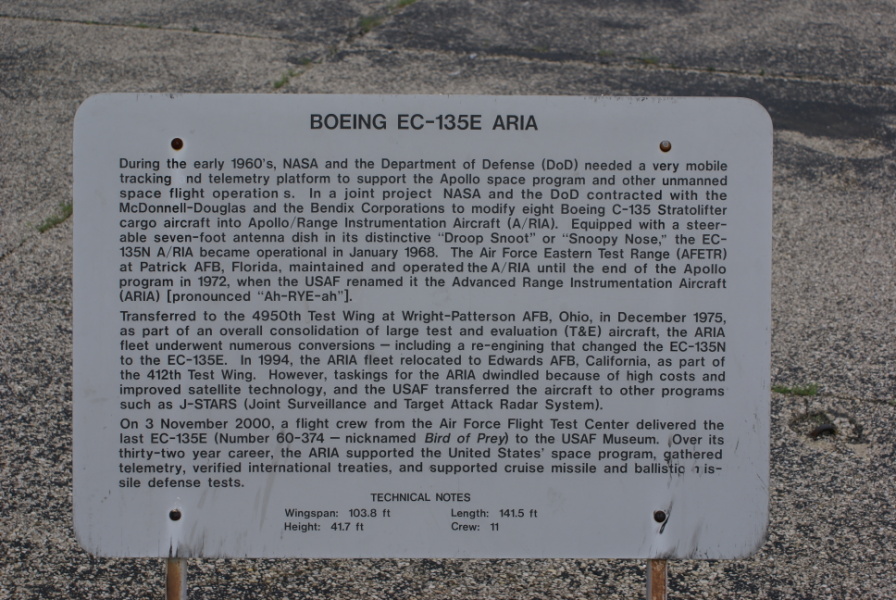| Prev |
heroicrelics.org Air Force Museum Site Index A/RIA Gallery |
Next |
dsc62338.jpg
The sign accompanying the plane. It reads
Boeing EC-135E ARIA
During the early 1960s, NASA and the Department of Defense (DoD) needed a very mobile tracking and telemetry platform to support the Apollo space program and other unmanned space flight operations. In a joint project, NASA and the DoD contracted with the McDonnell-Douglas and the Bendix Corporations to modify eight Boeing C-135 Stratolifter cargo aircraft into Apollo/Range Instrumentation Aircraft (A/RIA). Equipped with a steerable seven-foot antenna dish in its distinctive "Droop Snoot" or "Snoopy Nose," the EC-135N A/RIA became operational in January 1968. The Air Force Eastern Test Range (AFETR) at Patrick AFB, Florida, maintained and operated the A/RIA until the end of the Apollo program in 1972, when the USAF renamed it the Advanced Range Instrumentation Aircraft (ARIA) [pronounced "Ah-RYE-ah"].
Transferred to the 4950th Test Wing at Wright-Patterson AFB, Ohio, in December 1975, as part of an overall consolidation of large test and evaluation (T&E) aircraft, the ARIA fleet underwent numerous conversions -- including a re-engining that changed the EC-135N to the EC-135E. In 1994, the ARIA fleet relocated to Edwards AFB, California, as part of the 412th Test Wing. However, taskings for the ARIA dwindled because of high costs and improved satellite technology, and the USAF transferred the aircraft to other programs such as J-STARS (Join Surveillance and Target Attack Radar System).
On 3 November 2000, a flight crew from the Air Force Test Flight Test Center delivered the last EC-135E (Number 60-374 - nicknamed Bird of Prey) to the USAF Museum. Over its thirty-two year career, the ARIA supported the United States' space program, gathered telemetry, verified international treaties, and supported cruise missile and ballistic missile defense tests.
Technical Notes Wingspan: 103.8 ft Length: 141.5 ft Height: 41.7 ft Crew: 11

| Time picture taken | Fri May 15 16:56:54 2009 |
| Location picture taken | Air Park Air Force Museum Dayton, OH |
| Prev | A/RIA Gallery | Next |